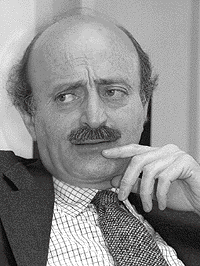Born in 1949 and educated at the American
University of Beirut and in France, Jumblatt was not politically active
in his youth. He had earned a reputation as a playboy, commonly wore jeans
and a leather jacket, rode a motorcycle, and broke with tradition by marrying
a non-Druze Jordanian woman.
At the end of the traditional 40-day mourning period, Jumblatt was summoned
to Damascus to meet with Syrian President Hafez Assad. "How you resemble
your father!" Jumblatt later recalled Assad saying upon his arrival,
a not-so-subtle hint that the young Druze leader would share his father's
fate if he did not come to terms with Syrian control of Lebanon. During
a subsequent meeting, Assad reportedly pointed to an empty chair and remarked:
"Your father, Allah have mercy on him, used to sit in that chair
over there." The fate that befell Kamal Jumblatt would prove to be
a powerful incentive for the young Druze leader.
Jumblatt's political inheritance was shaky from the start, as he lacked
the political stature, experience, and charisma of his late father. Between
1977 and 1982, opposition to his leadership within the Druze community
emanated both from the rival Arslan clan and the Druze religious establishment.
In June 1982, Israeli forces invaded Lebanon and quickly occupied the
Shouf region. For a few months, Jumblatt remained at his home in Mukhtara
and maintained contact with occupying Israeli forces, hoping to broker
a deal whereby Israel would keep the Palestinians out of the Shouf and
recognize Druze autonomy. To his consternation, however, Israel facilitated
the entry of the Christian Lebanese Forces (LF) units commanded by Samir
Geagea into the area. Frustrated, Jumblatt left his home and moved to
Damascus to secure support against the LF. Since the new Lebanese regime
of President Amine Gemayel had forged political ties with the Arslan clan,
Jumblatt was more than willing to join the National Salvation Front, a
pro-Syrian alliance of militias opposed to the central government and
the May 1983 non-belligerency agreement it signed with Israel.
Armed with massive amounts of Syrian-supplied Soviet weaponry, Jumblatt's
militia began driving LF forces out of the Shouf in the fall of 1983.
When Israeli forces pulled out of the area in August-September 1983, Jumblatt's
forces overran sixty Maronite villages, slaughtering around 1,000 people
and driving 50,000 out of their homes. in the mountainous areas east and
west of Beirut. When Jumblatt's militia overstepped itself and attempted
to overrun the Souq al-Gharb pass protecting the capital, Lebanese army
troops commanded by Michel Aoun brought the offensive to a halt. Nevertheless,
Jumblatt's victory made him the undisputed leader of the Druze community,
a position which has not been seriously contested to this day.
The PSP scored a major strategic victory by obtaining an outlet to the
sea in the Iqlim al-Kharoub region. This, however proved to be a double-edged
sword, as it obstructed Shi'ite aspirations to build an autonomous enclave
in southern Lebanon contiguous with Shi'ite neighborhoods in the southwestern
portion of Beirut. Periodic fighting between the PSP and the Amal militia
of Nabih Berri persisted in West Beirut and surrounding areas throughout
the remainder of the civil war despite their mutual alliance with Syria,
engendering a deep-rooted animosity between the two leaders that continues
to this day.
Throughout the war-torn 1980's, Jumblatt remained within the Syrian fold,
supporting the Assad regime's efforts to torpedo any reconciliation agreement
that did not explicitly grant Damascus political and military control
over Lebanon. However, unlike Berri, Jumblatt maintained good relations
with other external actors, most notably Libya and the Soviet Union, and
even resumed back-channel contacts with the Israelis, in order to keep
his options open.
During the late 1990's, the son and heir apparent of the Syrian president, Bashar Assad, began methodically undermining potential opposition to his succession. In 1998, he assumed control of the "Lebanon file" from Syrian Vice-President Abdul Halim Khaddam and brought about the ouster of Syrian Military Chief-of-Staff Hikmat Shihabi, fearing that they would use their political connections in Lebanon to undermine his authority. Both were key allies of Jumblatt and then-Prime Minister Rafiq Hariri, and so Syria's domestic political purge naturally had ramifications in Lebanon. In the fall of 1998, Bashar backed the election of Gen. Emile Lahoud as president of Lebanon, engineered Hariri's ouster as prime minister, and took away Jumblatt's cabinet portfolio.
In order to secure votes from Christian residents of the Shouf, he forged electoral alliances with the Christian Kata'ib and National Bloc parties and negotiated a "political charter" with Amin Gemayel, who had returned to the country in July. Moreover, he began calling for a "correction" of Syrian-Lebanese ties and condemning Syrian interference in the political process. As a result, Jumblatt and his political allies scored landslide victories and obtained three cabinet positions (though Jumblatt himself declined to join the government). Jumblatt, however, was unwilling to dispense with the newfound popularity among the population at large that came with his public criticism of Syria. In November, when Christian members of parliament criticized the Syrian occupation during a televised debate, Jumblatt could not resist the opportunity to reiterate his objections to Syrian interference in Lebanese politics. "I do understand the importance of stationing some Syrian troops (in Lebanon) for strategic purposes and the requirements of Syrian national security in the context of the Arab-Israeli conflict," Jumblatt told the parliament, "but I do hope the Syrian leadership will review some of the points which have nothing to do with strategic requirements." He added that Prime Minister Hariri's claim that the Syrian occupation as "necessary, legitimate and temporary" was too vague. "If the presence is necessary, let us decide its timetable."
Walid Joumblat, born 1949
